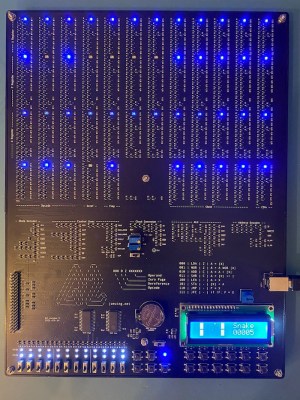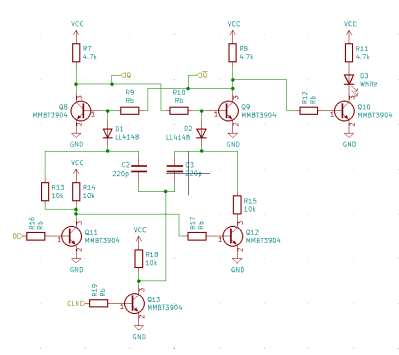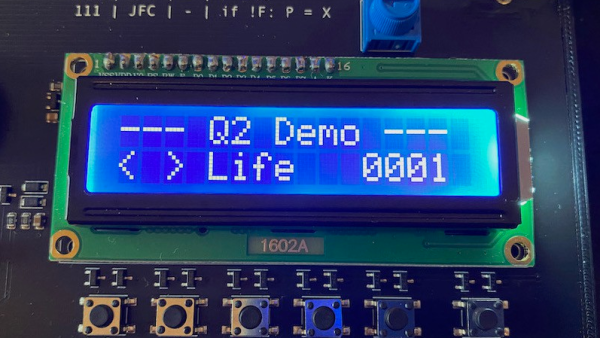[Joe Wingbermuehle] has an interest in computers-of-old, and some past experience of building computers on perfboard from discrete transistors, so this next project, Q2, is a complete implementation of a PDP8-like microcomputer on a single PCB. Like the DEC PDP-8, this is a 12-bit machine, but instead of the diode-transistor logic of the DEC, the substantially smaller Q2 uses a simple NMOS approach. Also, the DEC has core memory, but the Q2 resorts to a pair of SRAM ICs, simply because who wants to make repetitive memory structures with discrete 2N7002 transistors anyway?

Like the PDP-8, this machine uses a bit-serial ALU, which allows the circuit to be much smaller than the more usual ALU structure, at the expense of needing a clock cycle per bit per operation, i.e. a single ALU operation will take 12 clock cycles. For this machine, the instruction cycle time is either 8 or 32 clocks anyway, and at a maximum speed of 80 kHz it’s not exactly fast (and significantly slower than a PDP-8) but it is very small. Small, and perfectly formed.
The machine is constructed from 1094 transistors, with logic in an NMOS configuration, using 10 K pullup resistors. This is not a fast way to build a circuit, but it is very compact. By looking at the logic fanout, [Joe] spotted areas with large fanouts, and reduced the pull-up resistors from 10 K to 1 K. This was done in order to keep the propagation delay within bounds for the cycle time without excessive power usage. Supply current was kept to below 500 mA, allowing the board to be powered from a USB connector. Smart!
Memory is courtesy of two battery-backed 6264 SRAMs, with the four 12-bit general purpose registers built from discrete transistors. An LCD screen on board is a nice touch, augmenting the ‘front panel’ switches used for program entry and user input. A 40-pin header was added, for programming via a Raspberry Pi in case the front panel programming switches are proving a bit tedious and error prone.

In terms of the project write-up, there is plenty to see, with a Verilog model available, a custom programming language [Joe] calls Q2L, complete with a compiler and assembler (written in Rust!) even an online Q2 simulator! Lots of cool demos, like snake. Game of Life and even Pong, add some really lovely touches. Great stuff!
We’ve featured many similar projects over the years; here’s a nice one, a really small 4-bit one, and a really big one.











